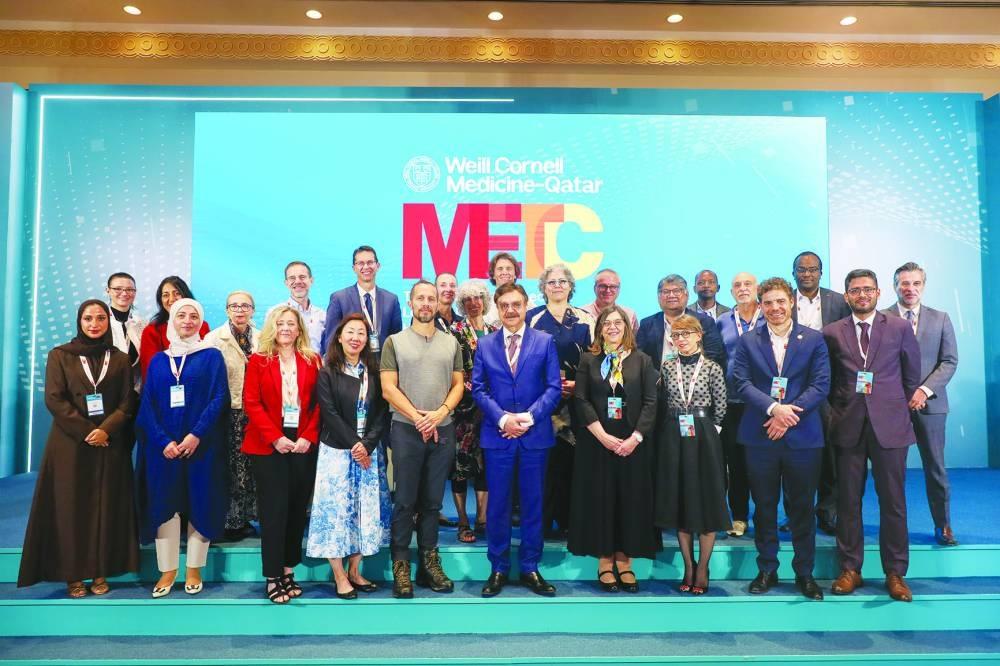
403
Sorry!!
Error! We're sorry, but the page you were looking for doesn't exist.
WCM-Q Conference Addresses Impact Of AI On Medical Education
(MENAFN- Gulf Times) Experts and futurists in medical education and artificial intelligence (AI) from around the world gathered in Doha for a conference organised by Weill Cornell Medicine-Qatar (WCM-Q), which explored how technological breakthroughs are revolutionising healthcare and the way medicine is taught.
The 2nd Medical Education Technology Conference brought together thought leaders in medical education, technology and the humanities from institutions in Qatar, the US, the UK and the Netherlands to explore the impact of new advances in AI, virtual reality (VR), and augmented reality (AR) on healthcare and education.
The conference, titled“The Power of Connection: Leveraging Technology for Humanistic Medical Education”, addressed the need to integrate study of the humanities with utilisation of advanced technologies to ensure medical education remains human-centered, ethical and compassionate.
The conference, co-directed by professor of clinical medicine and vice-dean for academic and curricular affairs Dr Thurayya Arayssi and Dr Anna Halama, the assistant professor of research in physiology and biophysics, also discussed the opportunities and challenges presented by advances in technology.
“New technologies, particularly AI and immersive learning, offer us incredibly powerful teaching tools that have the potential to make medical education radically more effective,” Dr Arayssi said.“However, it is incumbent upon us to ensure that these disruptive technologies are deployed in ways which enable medical education programmes to continue to cultivate empathy, compassion and creativity in future physicians.”
The conference featured a series of presentations by expert speakers, Q&A panel discussions, and multiple opportunities for attendees to gain hands-on interactive experiences with technologies such as immersive content creation and VR simulations.
Presentations discussed the impact of AI on the cognitive development of students and physicians, the emotional and psychological effects of immersive technologies used for medical simulation-based teaching, and the potential benefits of“gamification” teaching methods.
The expert speakers at the conference were drawn from elite international medical and educational institutions, including Weill Cornell Medicine in New York; Cornell University in Ithaca, New York; the University of Cambridge, UK; Kenyon College, Ohio; UCI School of Medicine, California; Southern Illinois University School of Medicine; Amsterdam University Medical Centre; and Princeton University, New Jersey.
The event drew participants from all over the world, with healthcare professionals, educators and students in attendance from Qatar, the wider Mena (Middle East and North Africa) region, the US, Europe, India and elsewhere.
“This excellent event underlined that the judicious integration of AI and technological advances into medical education has the potential to enhance the acquisition of skills, knowledge and professionalism, which can all help improve patient care,” said WCM-Q dean Dr Javaid Sheikh.“At WCM-Q, we believe in embracing innovation to improve healthcare education, while also working hard to maintain the humanistic values of compassion, care, and empathy that form the core principles of responsible physicianship.”Weill Cornell Medicine-Qatar artificial intelligence
The 2nd Medical Education Technology Conference brought together thought leaders in medical education, technology and the humanities from institutions in Qatar, the US, the UK and the Netherlands to explore the impact of new advances in AI, virtual reality (VR), and augmented reality (AR) on healthcare and education.
The conference, titled“The Power of Connection: Leveraging Technology for Humanistic Medical Education”, addressed the need to integrate study of the humanities with utilisation of advanced technologies to ensure medical education remains human-centered, ethical and compassionate.
The conference, co-directed by professor of clinical medicine and vice-dean for academic and curricular affairs Dr Thurayya Arayssi and Dr Anna Halama, the assistant professor of research in physiology and biophysics, also discussed the opportunities and challenges presented by advances in technology.
“New technologies, particularly AI and immersive learning, offer us incredibly powerful teaching tools that have the potential to make medical education radically more effective,” Dr Arayssi said.“However, it is incumbent upon us to ensure that these disruptive technologies are deployed in ways which enable medical education programmes to continue to cultivate empathy, compassion and creativity in future physicians.”
The conference featured a series of presentations by expert speakers, Q&A panel discussions, and multiple opportunities for attendees to gain hands-on interactive experiences with technologies such as immersive content creation and VR simulations.
Presentations discussed the impact of AI on the cognitive development of students and physicians, the emotional and psychological effects of immersive technologies used for medical simulation-based teaching, and the potential benefits of“gamification” teaching methods.
The expert speakers at the conference were drawn from elite international medical and educational institutions, including Weill Cornell Medicine in New York; Cornell University in Ithaca, New York; the University of Cambridge, UK; Kenyon College, Ohio; UCI School of Medicine, California; Southern Illinois University School of Medicine; Amsterdam University Medical Centre; and Princeton University, New Jersey.
The event drew participants from all over the world, with healthcare professionals, educators and students in attendance from Qatar, the wider Mena (Middle East and North Africa) region, the US, Europe, India and elsewhere.
“This excellent event underlined that the judicious integration of AI and technological advances into medical education has the potential to enhance the acquisition of skills, knowledge and professionalism, which can all help improve patient care,” said WCM-Q dean Dr Javaid Sheikh.“At WCM-Q, we believe in embracing innovation to improve healthcare education, while also working hard to maintain the humanistic values of compassion, care, and empathy that form the core principles of responsible physicianship.”Weill Cornell Medicine-Qatar artificial intelligence

Legal Disclaimer:
MENAFN provides the
information “as is” without warranty of any kind. We do not accept
any responsibility or liability for the accuracy, content, images,
videos, licenses, completeness, legality, or reliability of the information
contained in this article. If you have any complaints or copyright
issues related to this article, kindly contact the provider above.


















Comments
No comment